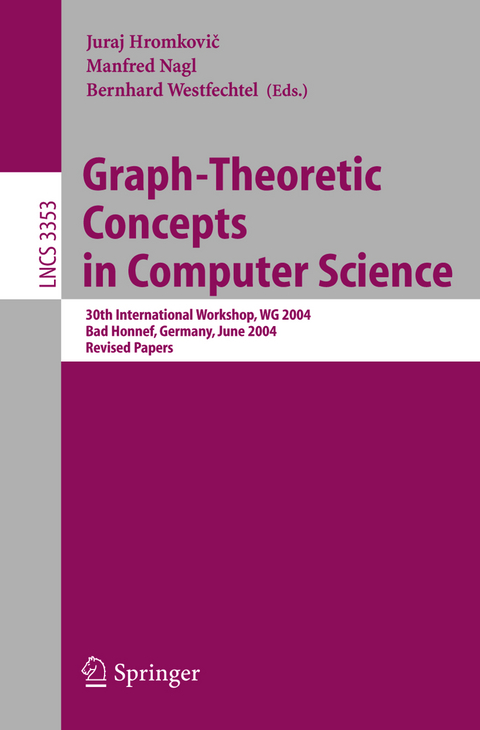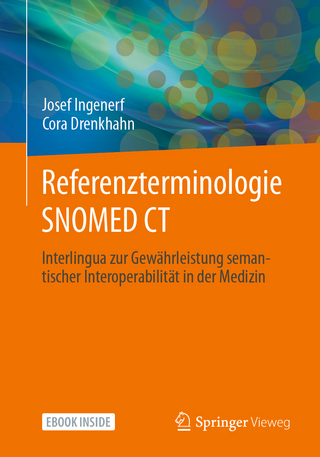
Graph-Theoretic Concepts in Computer Science
Springer Berlin (Verlag)
978-3-540-24132-4 (ISBN)
Prof. Dr. Juraj Hromkovic war 1997 - 2003 Professor für Algorithmen und Komplexität an der RWTH Aachen. Seit Januar 2004 ist er Professor für Informatik an der ETH Zürich. Seit 2010 ist er Mitglied der Academia Europaea.
Prof. Dr.-Ing. habil. Manfred Nagl ist Inhaber des Lehrstuhls Informatik III an der Rheinisch-Westfälischen Technischen Hochschule Aachen.
Invited Papers.- Lexicographic Breadth First Search - A Survey.- Wireless Networking: Graph Theory Unplugged.- Graph Algorithms: Trees.- Constant Time Generation of Trees with Specified Diameter.- Treelike Comparability Graphs: Characterization, Recognition, and Applications.- Elegant Distance Constrained Labelings of Trees.- Collective Tree Spanners and Routing in AT-free Related Graphs.- Graph Algorithms: Recognition and Decomposition.- On the Maximum Cardinality Search Lower Bound for Treewidth.- Fully-Dynamic Recognition Algorithm and Certificate for Directed Cographs.- Recognizing HHD-free and Welsh-Powell Opposition Graphs.- Bimodular Decomposition of Bipartite Graphs.- Coloring a Graph Using Split Decomposition.- Graph Algorithms: Various Problems.- Decremental Clique Problem.- A Symbolic Approach to the All-Pairs Shortest-Paths Problem.- Minimal de Bruijn Sequence in a Language with Forbidden Substrings.- A Graph-Theoretic Generalization of the Least Common Subsumer and the Most Specific Concept in the Description Logic .- Optimization and Approximation Algorithms.- The Computational Complexity of the Minimum Weight Processor Assignment Problem.- A Stochastic Location Problem with Applications to Tele-diagnostic.- A Robust PTAS for Maximum Weight Independent Sets in Unit Disk Graphs.- Tolerance Based Algorithms for the ATSP.- Parameterized Complexity and Exponential Algorithms.- Finding k Disjoint Triangles in an Arbitrary Graph.- Exact (Exponential) Algorithms for the Dominating Set Problem.- Linear Kernels in Linear Time, or How to Save k Colors in O(n 2) Steps.- Counting, Combinatorics, and Optimization.- Planar Graphs, via Well-Orderly Maps and Trees.- Efficient Computation of the Lovász Theta Function for a Class of Circulant Graphs.- UnhookingCirculant Graphs: A Combinatorial Method for Counting Spanning Trees and Other Parameters.- Applications (Biology, Graph Drawing).- Computing Bounded-Degree Phylogenetic Roots of Disconnected Graphs.- Octagonal Drawings of Plane Graphs with Prescribed Face Areas.- Crossing Reduction in Circular Layouts.- Graph Classes and NP Hardness.- Characterization and Recognition of Generalized Clique-Helly Graphs.- Edge-Connectivity Augmentation and Network Matrices.- Partitioning a Weighted Graph to Connected Subgraphs of Almost Uniform Size.- The Hypocoloring Problem: Complexity and Approximability Results when the Chromatic Number Is Small.- Core Stability of Minimum Coloring Games.
| Erscheint lt. Verlag | 21.12.2004 |
|---|---|
| Reihe/Serie | Lecture Notes in Computer Science |
| Zusatzinfo | XI, 404 p. |
| Verlagsort | Berlin |
| Sprache | englisch |
| Maße | 155 x 235 mm |
| Gewicht | 625 g |
| Themenwelt | Informatik ► Theorie / Studium ► Algorithmen |
| Mathematik / Informatik ► Mathematik | |
| Schlagworte | Algorithm analysis and problem complexity • algorithmic geometry • Algorithmic Graph Theory • algorithms • Bioinformatics • combinatorial optimization • combinatorics • Complexity • Complexity theory • Computational Discrete Mathematics • Computer • Computer Science • data structures • Graph • Graph Algorithms • graph coloring • Graph Computations • graph decomposition • Graph Drawing • Graphentheorie • Graph Grammars • network algorithms • Optimization |
| ISBN-10 | 3-540-24132-9 / 3540241329 |
| ISBN-13 | 978-3-540-24132-4 / 9783540241324 |
| Zustand | Neuware |
| Haben Sie eine Frage zum Produkt? |
aus dem Bereich


